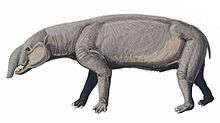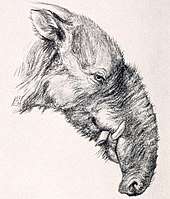Astrapotherium
| Astrapotherium | |
|---|---|
 | |
| Skull | |
| Scientific classification | |
| Kingdom: | Animalia |
| Phylum: | Chordata |
| Class: | Mammalia |
| Order: | †Astrapotheria |
| Family: | †Astrapotheriidae |
| Genus: | †Astrapotherium Burmeister, 1879 |
| Type species | |
| Astrapotherium magnum Owen, 1853 | |
| Species | |
| |
| Synonyms | |
| |
Astrapotherium ("Lightning Beast") is an extinct genus of South American mammal which vaguely resembled a cross between a small elephant, and a very large tapir. This peculiar-looking animal was unrelated to modern elephants, and was, instead, related to other extinct South American ungulates. The beast lived in the Early to Middle Miocene.[1] Fossil remains of the type species A. magnus ("Great Lightning Beast") have been found in the Santa Cruz Formation in Argentina. Other fossils have been found in the Deseado, Sarmiento and Aisol Formations of Argentina and Chile (Cura-Mallín).[1]
Description

Astrapotherium had an elongated body, with a total length of about 2.5 metres (8.2 ft), a weight of nearly 1,000 kilograms (2,200 lb), and relatively short limbs. It had small plantigrade feet, and the hind limbs were significantly weaker than the fore limbs. Its four canine teeth were elongated to form short tusks, and it had broad protruding lower incisors which likely ground against a horny pad in the upper jaw, as in many modern ruminants.[2]
The nostrils were placed high on the head, which might indicate the presence of a trunk, but could equally be due to other reasons, such as an inflatable nasal cavity.
Classification

Cladogram based in the phylogenetic analysis published by Vallejo-Pareja et al., 2015, showing the position of Astrapotherium:[3]
|
Eoastrapostylops | |||||||||||||||||||||||||||||||||||||||||||||||||||||||||||||||||||||||||||||||
|
| |||||||||||||||||||||||||||||||||||||||||||||||||||||||||||||||||||||||||||||||
Paleobiology

The animal was probably at least partially aquatic, living in shallow water and feeding on marsh plants in a similar manner to a modern hippopotamus.[2]
References
- 1 2 Astrapotherium at Fossilworks.org
- 1 2 Palmer, D., ed. (1999). The Marshall Illustrated Encyclopedia of Dinosaurs and Prehistoric Animals. London: Marshall Editions. p. 248. ISBN 1-84028-152-9.
- ↑ M. C. Vallejo-Pareja; J. D. Carrillo; J. W. Moreno-Bernal; M. Pardo-Jaramillo; D. F. Rodriguez-Gonzalez; J. Muñoz-Duran (2015). "Hilarcotherium castanedaii, gen. et sp. nov., a new Miocene astrapothere (Mammalia, Astrapotheriidae) from the Upper Magdalena Valley, Colombia". Journal of Vertebrate Paleontology. Online edition. doi:10.1080/02724634.2014.903960.
External links
| Wikimedia Commons has media related to Astrapotherium. |